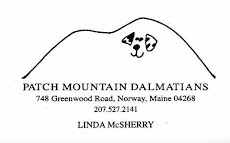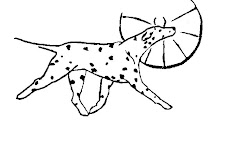
Maeve resting under the heat lamp with her babies. Because puppies can't generate their own body heat, it is the breeder's responsibility to make sure all are warm and happy, thus the heat lamp. Now everyone is toasty warm, fed and happy.
Linda and I will be working on getting the puppies AKC registration process in the next few days. Because according to the records we are both listed as co-breeders we both have to sign tons of paperwork. We will start the ball rolling now so puppy papers are ready when the pups go to their new homes.
Here is an interesting article on why to buy an AKC registered puppy.
The ad said “AKC registered puppies, $400.”
Below it, another ad for the same breed read “Puppies, no papers, $150.”
What's the difference?
By the organization's own admission, American Kennel Club registration is not a mark of quality. In many cases, it indicates that the breeder has taken some steps to assure that the puppies meet the breed standard in some fashion — in other words, that they look and act like the breed they are identified to be. However, the fact of registration, a process that requires that registered dogs are used as sire and dam of the litter and costs the breeder some money, may indicate either that the breeder cares about the puppies or wants merely to get a few more dollars for each puppy.
Puppies without papers might be fine examples of their breeds, but they are less likely to be so. A $150 puppy of whatever breed without papers is also likely to be less physically or mentally sound than a more expensive puppy of the same breed. While it is not always true that you get what you pay for when buying puppies, the difference between those two puppies may be far more than the presence or absence of a piece of paper.
Buyers should ask what else they get for the registered puppy. If the sire and dam have been screened for genetic diseases, the puppies are clean, healthy, and well-socialized, the breeder offers a contract that protects the breeder, the buyer, and the puppy, that additional money buys a lot. If those things are not available from a breeder, the quality of the puppy is suspect.
But back to AKC registration.
Actually, the puppy is only registered as a member of a litter by the breeder. The buyer gets a slip giving the names of sire and dam, the breeder, and a physical description of the puppy that must be filled out with the puppy's name and the buyer's signature. The puppy name can be up to 25 characters and must be unique. For example, a puppy with the call name Sassy might be named Nancy's Sassafras or may include a kennel name, as in Nancy's Sassafras of Oaktree.
Puppies can be assigned full or limited registration by the breeder. Limited registration is for puppies that the breeder does not consider breeding quality; if they are bred, their puppies cannot be registered. The individual puppy is not registered unless the registration form is filled out and mailed to AKC.
When the puppy is registered, he is eligible to compete in all AKC competitions, bringing to his family the opportunity to enter the exciting world of dog shows. Far from being an elite and limited field of interest, dog shows are far more than the Westminster Kennel Club Show seen each February on cable television. AKC runs more than 13,000 events each year ranging from the “beauty contests” epitomized by Westminster to field events, obedience trials, and agility competitions.
Included are
- Conformation shows, some for all breeds, others for a single breed. Judges at these shows evaluate the dogs for adherence to the breed standard, to see if the dogs look, move, and act like the breed they represent. Junior showmanship, an opportunity for youngsters aged 10-18 to compete with the purebred, registered family pet. In this event, the entrants are judged for their ability to handle the dog and show its best characteristics to the judge. Junior showmanship helps teach patience, poise, and sportsmanship.
- Obedience trials promote the partnership between people and their pets. Contestants compete at three levels, each more difficult than the last. Obedience competition builds on the basic manners that every dog needs and calls for some creative problem-solving to teach the dog exercises ranging from a drop-on-recall to finding an item scented by the handler.
- Agility trials are the next step in dog-owner companionship. Agility involves teaching the dog to maneuver over, under, around, and through obstacles such as an A-frame wall, a teeter-totter, tunnels, and a variety of jumps. Agility training is for dogs with basic obedience training that are at least six months and preferably more than a year old.
- Tracking tests evaluate a dog's ability to follow a trail by scent. The dog must track a person over uneven terrain and retrieve scented articles.
- Junior showmanship, obedience, agility, and tracking events are open to all breeds registered by AKC.
For more information about AKC registration and events, visit the AKC website at www.akc.org .


No comments:
Post a Comment